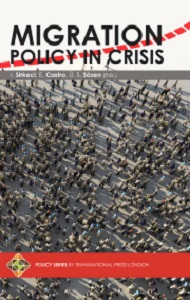HUMANITARIAN SECURITIZATION OF THE 2015 “MIGRATION CRISIS”: INVESTIGATING HUMANITARIANISM AND SECURITY IN THE EU POLICY FRAMES ON OPERATIONAL INVOLVEMENT IN THE MEDITERRANEAN
HUMANITARIAN SECURITIZATION OF THE 2015 “MIGRATION CRISIS”: INVESTIGATING HUMANITARIANISM AND SECURITY IN THE EU POLICY FRAMES ON OPERATIONAL INVOLVEMENT IN THE MEDITERRANEAN
Author(s): Maciej Stępka
Subject(s): Politics, Geography, Regional studies, Human Rights and Humanitarian Law, Security and defense, Policy, planning, forecast and speculation, Present Times (2010 - today), Migration Studies, EU-Legislation
Published by: Transnational Press London
Keywords: 2015; migration crisis; humanitarian securitization; EU policy; Mediterranean;
Summary/Abstract: The 2015 “migration crisis” has stimulated the European political imagination with an image of migration and border control as based on a mixture of humanitarianism and security. Indeed, the European borders and migratory routes have been increasingly framed in the media and political debates as the sites of a humanitarian and security emergency (see Dekker & Scholten, 2017; Greussing & Boomgaarden, 2017; Ibrahim & Howarth, 2017). The accounts of children dying in the Mediterranean have been reproduced together with images of uncontrollable crowds gathering at the borders, and again with overburdened reception centres with deplorable humanitarian conditions (see BBC, 2018; The Guardian, 2018; Reuters, 2018). All these framings have been (re)merging in the public debate, building a sense of humanitarian crisis, but also insecurity and uncertainty regarding the most suitable course of action at the European level. Regardless the European Union’s (EU) attempts to respond to the increased migratory flows, the humanitarian situation has been getting more severe, generating a political momentum for mobilization of more decisive, security-oriented and even militarized measures in dealing with the crisis. Consequently, the EU has decided to increase its operational and military presence in the Mediterranean with Frontexled Joint Operations (JO) (i.e. Triton, Poseidon and Themis) and Common Security and Defence Policy (CSDP) naval mission (i.e. EUNAVFOR MED Sophia), explicitly framing the mobilization of security capabilities as search and rescue and “live saving” operations.
Book: Migration Policy in Crisis
- Page Range: 9-30
- Page Count: 22
- Publication Year: 2018
- Language: English
- Content File-PDF

